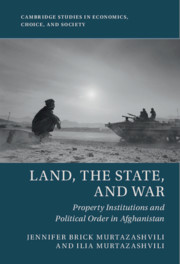Book contents
- Land, the State, and War
- Land, the State, and War
- Copyright page
- Dedication
- Contents
- Photographs and Drawings
- Maps
- Figures
- Tables
- Maps
- Acknowledgments
- Glossary
- Abbreviations
- Chronology of Events
- 1 Introduction
- 2 A Theory of Property Rights
- 3 Property Rights and State Building
- 4 Property Rights and War
- 5 Self-governance of Property Rights
- 6 Self-governance, War, and the Commons
- 7 Self-governance, Legal Titling, and the State
- 8 Are Property Rights a Cause or Consequence of Political Order?
- Appendix
- References
- Index
1 - Introduction
Published online by Cambridge University Press: 20 August 2021
- Land, the State, and War
- Land, the State, and War
- Copyright page
- Dedication
- Contents
- Photographs and Drawings
- Maps
- Figures
- Tables
- Maps
- Acknowledgments
- Glossary
- Abbreviations
- Chronology of Events
- 1 Introduction
- 2 A Theory of Property Rights
- 3 Property Rights and State Building
- 4 Property Rights and War
- 5 Self-governance of Property Rights
- 6 Self-governance, War, and the Commons
- 7 Self-governance, Legal Titling, and the State
- 8 Are Property Rights a Cause or Consequence of Political Order?
- Appendix
- References
- Index
Summary
In much of the developing world, legal titling – the registration of land ownership through a formal, judicial process – is viewed as a path to economic development and political order. The introductory chapter explains why legal titling is unlikely to fulfill this promise. It begins by making a case that the new institutional economics and public choice, which were developed and applied to date in mostly Western contexts, are useful in understanding political, economic, and social institutions in the Islamic world. We then introduce our theory of emergence and change in property rights, which explains the situations when we expect the government to define and enforce property rights, when self-governance of property rights can work, and why it is unlikely that legal titling will be feasible as a development strategy in a typical fragile state. We conclude by introducing our empirical study of Afghanistan. The highlights of the empirical study include fieldwork conducted by one of the authors in thirty villages in rural Afghanistan, which resulted in hundreds of interviews with ordinary villagers, customary village leaders, and local government officials.
Keywords
- Type
- Chapter
- Information
- Land, the State, and WarProperty Institutions and Political Order in Afghanistan, pp. 1 - 22Publisher: Cambridge University PressPrint publication year: 2021

